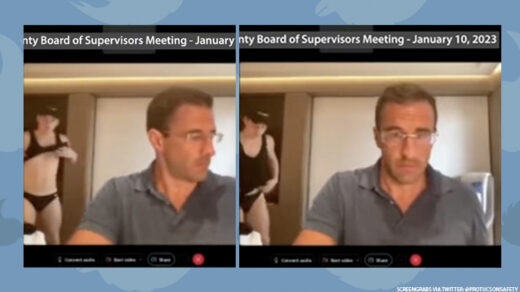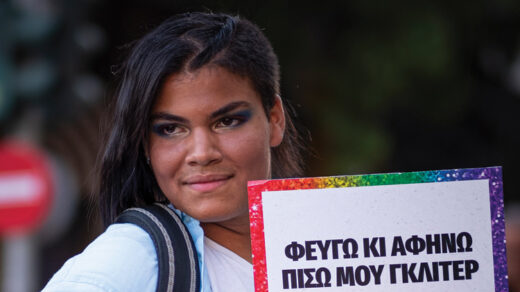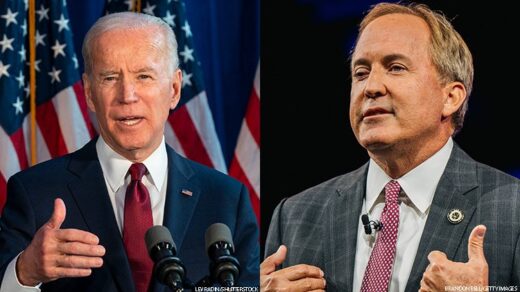Jose Antonio Vargas Opens Up About Being Undocumented and Gay
Since coming out as undocumented in 2011, Jose Antonio Vargas has become one of the most prominent voices fighting for the rights of undocumented people.
Now, almost a decade later, the Pulitzer Prize-winning journalist and author of Dear America: Notes Of An Undocumented Citizen, is ready to focus more energy on himself, starting with his sexuality. ” I would actually argue that now that I’ve come out about the undocumented thing, I’m trying to understand the gay thing,” he says. “I think I went to a gay pride parade maybe once in my life. No, twice. But I didn’t want to be there.”
Being undocumented has colored his entire life, even his personal relationships he’s still discovering. On this week’s episode of LGBTQ&A, Jose Antonio Vargas talks about becoming more comfortable with his queerness, why the mainstream media’s coverage of immigration is so dangerous, and why problems in the immigrations system are bigger than the issues of the current administration.
Listen to the full podcast interview on Apple Podcasts, Spotify, or Stitcher.
Jeffrey Masters: You learned that you were undocumented over 20 years ago. That’s such a long time to live with that stress and ambiguity.
Jose Antonio Vargas: That’s what I was getting at in the book. The main question I had was, Why am I this messed up? Why do I have a hard time having relationships with people? Why does it seem as if I’ve created borders and walls with the way I treat my own friends?
I’m 38 years old and I’ve never had a boyfriend. What is that about? I’ve never been in a committed, long relationship with anybody. Because what was the point? I was going to get deported. I was going to leave. I always had this feeling that everything was temporary. Nothing was permanent.
My friend, Manny, is one of my few gay male friends. I don’t have a lot of gay male friends. I’m trying to work on that. He thinks I’m like a hurricane. I show up once in a while, I create all this mess, and then I leave. That’s how I am with friends. I don’t have a crew.
Now I understand that this is really not sustainable. I can’t just be expecting friends to be there for me and then I’m not there for them because I’m too busy living in my depression and living in my head.
JM: And you write that coming out as undocumented was a much bigger deal than coming out as gay.
JAV: I had the privilege of living where I lived. I was in Mountain View, which is an hour south of San Francisco. My Catholic, Filipino family was like, “What is this gay thing? You’re supposed to get married to a woman and be a U.S. Citizen.” But then I had a very accepting school.
JM: Did those balance each other out?
JAV: I was the first openly gay student at my high school.
Now that I’ve come out about the undocumented thing, I’m trying to understand the gay thing. I think I went to a gay Pride parade maybe once in my life. No, twice. I went to the one in New York, but I didn’t want to be there.
I don’t know what gay Pride is. I’m still kind of confused by gay Pride. I came out in 1999. It was a few months after the Matthew Shepard tragedy. I came out of necessity because if I had not come out as gay, then my grandfather’s plan was for me to marry a woman who is a U.S. citizen and try to get my papers that way.
Coming out that first time was a way of saying, “Wait a second. No. One lie was enough. I’m not going to lie about this.”
I would argue that I’m probably still in the closet about the gay thing because I’m still dealing with that. I don’t know what that really is for me.
JM: I didn’t realize you were gay until I read your book.
JAV: There’s a line in that book that when I wrote it, I was so scared after writing it that I think I left the computer screen and took a long ass walk.
JM: What was the line?
JAV: Home is not something I should have to earn. After I wrote that line, I remember looking at the computer going like, “Ay ay ay.”
I had this quote from Toni Morrison, who’s one of my oracles. The quote is, “I stood at the border, stood at the edge, and claimed it as central. And let the rest of the world move over to where I was.”
I had put it at the very top of the computer so that whenever I feel like I’m going into my reporter mode, where I’m better at talking about other people than myself, I have to remind myself, “Oh, this actually my book. Do not be scared of I, me, and my.”
The line, home is not something I should have to earn, that really, for me, was life-changing. I realized not only am I not done, but home is already here, and it’s not a physical space. Home is actually all of these people in my life that have made me feel at home.
JM: You write that apart from a few notable exceptions, the mainstream media’s coverage of immigration is lackluster at best and irresponsible at worst. “It promotes and sustains stereotypes while supporting misinformation.” Whenever we discuss immigration, it always comes back to Latinx people.
JAV: There’s 56 million Latinx people in this country, 33 million of whom are Mexican. I actually think we owe all of them an apology…the fact that we’ve racialized this issue to such a point that people think it’s only about Latinx people.
I would argue — this Trump era that we’re living through, which is way bigger than Trump — what we’re facing is the fact that we have never faced the full force of our history. What would James Baldwin say? White people are trapped in a history that they do not understand.
I hope one of the reactions of what’s happening is that all of us would want to understand our history much fuller, the uglier parts of it.
What does citizen mean? What does it mean to be a citizen? How do the people fighting for the Black Lives Matter movement, LGBTQ movement, the #MeToo movement, the Income Inequality movement, the Immigrant Freedom movement, what do we all have in common?
To me, the question of citizenship and how do I sit here in front of you, claim myself, all the while knowing that I’m never the only person in the room. That we all share a space whether or not we like it.
When you disagree with somebody, that’s just the beginning of the conversation, not the end. That’s when you have to go, Why? Why do you think like that? Where’d you get that from? Who told you? Why did you believe it? That’s just a start.
Listen to the full podcast interview on Apple Podcasts, Spotify, or Stitcher.
Dear America: Notes Of An Undocumented Citizen, as well as a young reader’s edition, are out now.
LGBTQ&A is The Advocate’s weekly interview podcast hosted by Jeffrey Masters. Past guests include Alok Vaid-Menon, Pete Buttigieg, Laverne Cox, Lili Reinhart, and Roxane Gay. Episodes come out every Tuesday.
Original Article on The Advocate
Author: Jeffrey Masters






